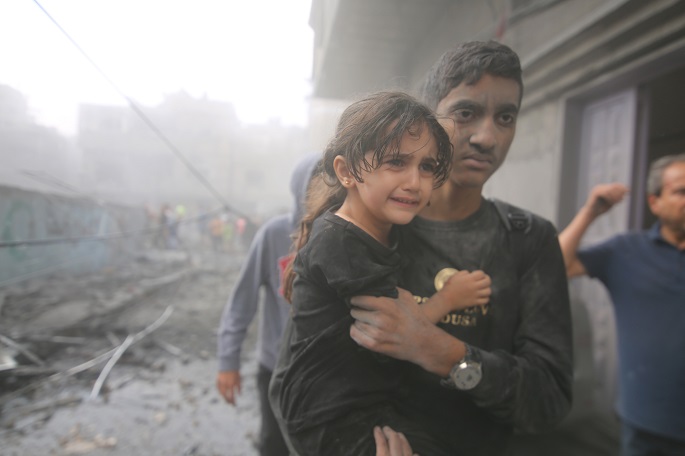Gazans fleeing south amid death fear
Published : 15 Oct 2023, 00:57
Updated : 15 Oct 2023, 01:00
Samar Shaker and her five children have been on the road for three hours, trying to flee to the southern part of the Gaza Strip after Israel issued an evacuation warning on Friday, reported Xinhua.
"Once the Israeli army ordered us to relocate from our area, I knew that they would kill more Gazans," the 39-year-old mother told Xinhua.
"I could no longer wait inside my house ... I was afraid of losing my children as many mothers did. So, I decided to follow the Israeli instructions," the mother said.
On Friday morning, the Israeli army ordered the civilians in the northern half of the besieged coastal enclave to relocate south in 24 hours.
The army allowed safe passage on two major routes in the Gaza Strip for several hours and resumed massive airstrikes afterward.
The evacuation warning caused confusion and panic among many Gazans, who rushed to flee from their houses by vehicles, carts pulled by donkeys or horses, or just on foot.
"Once again, we experienced the Palestinian Catastrophe (Nakba) in 1948. We lived the same fear of killing, displacement, and not knowing our fate. It seems that Israel wants us to live as immigrants forever," the woman said.
Mohammed Farraj, another Gazan man displaced from the Daraj neighborhood in Gaza City, said he had no idea where to go.
The 52-year-old father of six said, "If I didn't evacuate my family they would surely be killed by the army ... The Israelis do not separate militants from civilians as they want to kill all Palestinians."
However, his journey to the southern Khan Younis City was not easy.
"I found a taxi to transport us. The driver charged 100 U.S. dollars," he said, describing the road was jammed with people heading south.
During the journey, Farraj told Xinhua that he saw the Israeli army attack four civilian vehicles and a truck transporting people, killing some of the passengers.
"It was a tragic scene. I thought that it was our turn to die," he recalled.
Both Faraj and Shaker said they were haunted by fears of unknown fate, which cannot be dispersed even by a cease-fire.
They said their houses were destroyed and they could not rebuild them any time soon. They also worried that the Israeli blockade could be tightened to punish them.
The United Nations and several humanitarian groups have sharply criticized Israel's evacuation order.
"Moving more than one million people across a densely populated warzone to a place with no food, water, or accommodation, when the entire territory is under siege, is extremely dangerous -- and in some cases, simply not possible," UN Secretary-General Antonio Guterres said Friday.
The Israel-Hamas conflict, as it entered the eighth day, has pushed the Palestinian death toll to 2,215, with 8,714 injuries, according to the Palestinian Health Ministry.
Meanwhile, the Israeli fatalities since Oct. 7 had reached 1,300, while nearly 3,400 were injured, Israeli media reported on Friday, citing official sources.


